|
|
Index |
| Mahler : Symphony
No. 1 |
Bruno Walter / New York
Philharmonic |
| Vivaldi:
Concerti e Cantate |
Rinaldo Alessandrini / Concerto
Italiano |
| Dvorak
: Works for String Quartet, Vol. 5 |
Vlach Quartet |
| Angela Hewitt
Plays Messiaen |
|
| Dvorak :
Symphonies No. 7, 8, 9 |
George Szell / Cleveland
Orchestra |
| Tobias Picker :
Emmeline |
George Manahan / Santa Fe Opera
Orchestra |
| Prokofiev
: Betrothal in a Monastery |
Valery Gergiev / Kirov Opera and
Orchestra |
| Art of
the Baroque Trumpet Vol. 2 |
|
| The
Black Madonna: Songs from Montserrat |
Michael Posch / Ensemble
Unicorn |
| Boismortier:
Ballets de Village et Sérénade |
Hervé Niquet / Le Concert
Spirituel. |
| Schubert :
Lieder |
Ian Bostridge, tenor |
| Bach:
The Well-Tempered Clavier (Book II) |
B. Lagacé / Organ of Église
Immaculée-Conception |
| Britten:
Choral Edition Vol. 2 |
Paul Spicer / Finzi Singers |
| My World |
Angela Gheorghiu, soprano
Malcolm
Martineau, piano |
| The Yellow Guide:
Opera |
|
| The
Yellow Guide : Classical Music |
|
| Eugen
D'Albert: Die Abreise |
Janos Kulka / Philharmonia
Hungarica |
| OPERA D'ORO |
|
Verdi: Don
Carlo |
Horst Stein / Vienna State
Opera |
Bellini: La
Sonnambula |
Leonard Bernstein / La Scala |
Richard
Wagner : Lohengrin |
Eugen Jochum / Bayreuth, 1954 |
| Richard
Strauss : Taillefer, Die Tageszeiten, etc. |
Michel Plasson / Dresdener
Philharmonic |
Haydn: Cello Concertos Nos. 1 &
2
Pleyel: Cello Concerto in C major |
Ivan Monighetti, cello
Akademie
für Alte Musik Berlin |
| Haydn:
Cello Concertos Nos. 1 &. 2 |
Han-Na Chang, cello
Sinopoli /
Sächsische Staatskapelle Dresden |
| Gershwin
Fantasy |
Joshua Bell, violin
John Williams
/ London Symphony Orchestra |
| Hans Krása
: Verlobung in Traum |
Zagrosek / Deutsche
Symphonie-Orchester Berlin |
Mendelssohn
: 17 Lieder ohne Worte
Grieg : 31 Lyric
Pieces |
Walter Gieseking, piano |
| Jane
Eaglen : Mozart and Strauss Arias |
Zubin Mehta / Israel
Philharmonic |
| Opera Gala |
|
| Vivaldi
: L'estro armonico, op. 3 |
Fabio Biondi / Europa Galante |
| Beethoven
: Piano Concerto No. 5 & Violin Concerto |
Jos van Immerseel, fortepiano / Vera
Beths, violin
Bruno Weil / Tafelmusik (Sony SK
63365) |
Mahler
: Symphony No. 1
Bruno
Walter / New York Philharmonic
MHK 63328 ADD Mono
***
$$$
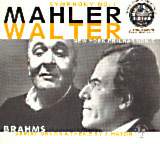 Bruno Walter's
1954 recording of Mahler's Symphony No. 1 is virtually archetypal - so
many subsequent conductors have copied his tempos, phrasing, and
dynamics. But few can match the authenticity of Walter's Viennese
touches, the parodies and the folk rhythms he knew first hand
(Walter was 17 in 1894 when he met Mahler for the first time). For
its beautifully packaged Masterworks Heritage series, Sony has
remastered the 1954 Carnegie Hall recording from the original mono
source but, alas, the boxy sound limits one's pleasure. Walter's
1961 stereo remake of the Titan symphony will be more popular with
audiophiles, though the earlier recording is of strong interpretive
interest.
Bruno Walter's
1954 recording of Mahler's Symphony No. 1 is virtually archetypal - so
many subsequent conductors have copied his tempos, phrasing, and
dynamics. But few can match the authenticity of Walter's Viennese
touches, the parodies and the folk rhythms he knew first hand
(Walter was 17 in 1894 when he met Mahler for the first time). For
its beautifully packaged Masterworks Heritage series, Sony has
remastered the 1954 Carnegie Hall recording from the original mono
source but, alas, the boxy sound limits one's pleasure. Walter's
1961 stereo remake of the Titan symphony will be more popular with
audiophiles, though the earlier recording is of strong interpretive
interest.
Vivaldi: Concerti e
Cantate
Rinaldo Alessandrini / Concerto Italiano
Opus
111 OPS- 30-181
*** $$$
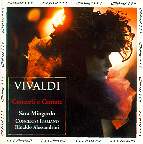 Easy to hear why this disc won a Diapason
d'Or. Though innumerable singers attempt this repertoire, few have
alto Sara Mingardo's natural gift. Her technique is exceptional, her
interpretation is tasteful, her timbre is warm and soulful. Too bad
she sings only 2 cantatas. The other half of this disc is filled
with 5 concertos for strings, played in the Concerto Italiano's
usual crisp, precise, buoyant style. The acoustic of the Villa
Mondragone in Frascati, Italy, is lively and pellucid. Texts and
excellent notes in English, French, German and Italian.
Easy to hear why this disc won a Diapason
d'Or. Though innumerable singers attempt this repertoire, few have
alto Sara Mingardo's natural gift. Her technique is exceptional, her
interpretation is tasteful, her timbre is warm and soulful. Too bad
she sings only 2 cantatas. The other half of this disc is filled
with 5 concertos for strings, played in the Concerto Italiano's
usual crisp, precise, buoyant style. The acoustic of the Villa
Mondragone in Frascati, Italy, is lively and pellucid. Texts and
excellent notes in English, French, German and Italian.
Dvorak : Works
for String Quartet, Vol. 5
Vlach Quartet (Naxos
8.553375)
*** $
In 1887 Dvorak arranged 12 songs from his 1865
cycle Cypresses, for string quartet.
The romantic vignettes are flush with gorgeous inventive melodies.
The Czechoslovak Vlach Quartet plays this music of their homeland
superbly, rich with every conceivable nuance, colour and inflection.
The recorded sound is intimate, balanced and detailed. Good notes in
English, French and German. An excellent recording.
Angela
Hewitt Plays Messiaen
Hyperion CDA 67054
***
$$$
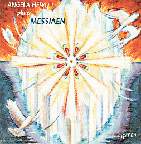 Canadian
pianist Angela Hewitt takes a break from Bach to record Messiaen.
She wrings maximum interest out of the early Préludes (1928),
conjuring colors and caressing content from these twisted amalgams
of Debussy and Scriabin. The Hyperion sound engineers capture every
detail of the extreme dynamic variations In the 4th, 10th and 16th
Regards sur l'Enfant-Jésus (about 25% of the whole work).
There is also much keyboard pounding in the Quatre Études de
rythme (1950), not for the
squeamish. Excellent program notes in English, French and German by
Hewitt herself.
Canadian
pianist Angela Hewitt takes a break from Bach to record Messiaen.
She wrings maximum interest out of the early Préludes (1928),
conjuring colors and caressing content from these twisted amalgams
of Debussy and Scriabin. The Hyperion sound engineers capture every
detail of the extreme dynamic variations In the 4th, 10th and 16th
Regards sur l'Enfant-Jésus (about 25% of the whole work).
There is also much keyboard pounding in the Quatre Études de
rythme (1950), not for the
squeamish. Excellent program notes in English, French and German by
Hewitt herself.
Dvorak : Symphonies No. 7,
8, 9
George Szell / Cleveland Orchestra
Sony MH2K
63151
**** $$$
Szell introduced Dvorak to the American
public almost single-handedly and his Dvorak symphony recordings,
made in 1958-60 after almost 15 years as the chief of the Cleveland
Orchestra, still stand beside the best in the catalogue. The
Cleveland sound is unsurpassed, with astonishing sonority,
transparent string tone and superb solo instrumentalists (especially
oboe and trumpet). Szell imposes his impeccable rhythm and style,
and the band plays as one man. The recorded sound is astonishingly
fine. The 2 CDs also contain Szell's stirring 1940 orchestration of
Smetana's Quartet in E-minor. This remastering is probably the high
point of the Masterwork's Heritage series to date. It is certainly
one of the best classical music recordings ever made.
Tobias
Picker : Emmeline
George Manahan / Santa Fe Opera
Orchestra
Albany Records (Troy 284-85)
*** $$$
Picker's Emmeline
(1996) is based on an old scandal. In 1862 Emmeline Mosher, a
34-year old woman from Fayette, Maine, married her own illegitimate
son whom she had given up for adoption twenty years earlier. J.D.
McClatchy's libretto follows the defining events of Emmeline's
destiny as retold in Judith Rossner's 1986 novel. Act I deals with
the girl's life in a cotton-mill and her seduction by a supervisor;
Act II describes her fateful encounter with son Matthew Gurney,
leading to her abandonment by the latter and total exclusion from
the community.
Unlike many American operas, Emmeline
celebrates private emotions rather than public politics. As in
Floyd's Susanna, the modern story is told within a
Biblical framework (in this case, the tale of Adam and Eve) and the
score itself has an air of "Appalachian spring" about it. New
England hymns and folk tunes, a touch of jazz (e.g. the orchestral
use of the piano and bass), and echoes of serialism are all
ingredients in Picker's rich blend of sounds. There are no arias as
such, but the melodic material is abundant and so well structured
that one can easily distinguish between "numbers". Best of all,
Picker avoids monotony - the great pitfall of contemporary opera -
by sharply individualizing each of his numerous scenes through
melody, rhythm, colour, symphonic interludes, etc.
Soprano Patricia Racette (Emmeline) is a top
class singer. Curt Peterson (Matthew) makes every word clear and
intelligible, but it is doubtful that his small, tart tenor voice
will make much of a mark in the standard repertory. A.-M. Owens
(Aunt Hannah) constantly seems to be forcing her voice to negotiate
the difficulties of singing in English. Introductory essays by the
composer and the librettist. Libretto in English only.
Pierre-Marc Bellemare
Prokofiev : Betrothal
in a Monastery
Valery Gergiev / Kirov Opera and
Orchestra
Philips 462-107-2
*** $$$
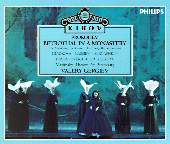 Gergiev's 1997
Betrothal is perhaps the best of the new Kirov opera
recordings. It is a musically exquisite, stunning detailed
interpretation of the dynamic score, capturing all the musical
strengths of a live performance. But because so much of this opera's
"situation comedy" depends upon visuals - gesture, facial
expression, slapstick, prop handling, entrances, exits and other
stage business - a recording tells only half the story. Betrothal
must be seen to be appreciated.
Libretto in Cyrillic, English, French and German.
Gergiev's 1997
Betrothal is perhaps the best of the new Kirov opera
recordings. It is a musically exquisite, stunning detailed
interpretation of the dynamic score, capturing all the musical
strengths of a live performance. But because so much of this opera's
"situation comedy" depends upon visuals - gesture, facial
expression, slapstick, prop handling, entrances, exits and other
stage business - a recording tells only half the story. Betrothal
must be seen to be appreciated.
Libretto in Cyrillic, English, French and German.
Art of the Baroque Trumpet
Vol. 2
Naxos 8.553593
*** $
The repertoire for baroque trumpet and organ
is sampled in this collection of 14 short pieces, including sonatas,
sinfonias and capriccios by Fanatini, Frescobaldi, Sweelinck and
Pezel composed between 1637-1675. Two valveless baroque trumpets
(with anachronistic finger holes, a 19th century innovation for
better pitch production) are accompanied by the 17th century-style
organ of Gothenburg's Haga Church. The organ part of this repertoire
is modest and recessive. The trumpets are the stars, and they sound
surprisingly sweet and nuanced for original instruments. Credit for
this goes to the Swedish trumpeters' nimble lips. Scholarly notes in
English, German and French explain the mysteries of baroque pitch,
making this disc both educational and enjoyable listening.
The Black
Madonna: Songs from Montserrat
Michael Posch / Ensemble
Unicorn
Naxos 8.554256
** $
Anyone into medieval music will want this
collection, which includes selections from the Llibre Vermell de
Monsterrat as well as
troubador songs. This repertoire is a fascinating mix of the sacred
and profane songs and dances used by pilgrims to Spain in the 1400s.
The reconstructions are imaginative, perhaps too much so for easy
listening. Barbara Sykes gives these songs a growly, gipsyish twist
in her rough, Lotte Lenya-ish voice. The results can sound more like
Arab vocalise or Muslim chants than what we now think of as
Christian church music.
Boismortier:
Ballets de Village et Sérénade
Hervé Niquet / Le Concert
Spirituel.
Naxos 8.553296
*** $
Le Concert Spirituel is a 17 member early
music ensemble founded in 1988. It specializes in 18th century
repertoire, such as this program of lively music by the prolific
French composer Joseph Bodin de Boismortier. These ballets,
serenades and gentillesses are aristocratic music inspired by the
classical rage for things rustic and pastoral. This was the age of
the Queen of France milking cows into silver buckets and salon music
incorporating peasant instruments such as bagpipes and
hurdy-gurdies. The result is a wonderful succession of sprightly,
toe-tapping country dance rhythms. When the musette (bagpipe) and
portable organ play together, the sound is startlingly modern, like
a synthesizer. Thematically this music is first cousin to Scottish
and Irish folk music. The recorded sound is extremely rich, vibrant
and detailed. Highly enjoyable.
Schubert :
Lieder
Ian Bostridge, tenor
Julius Drake, piano (EMI
7243 556347 26)
*** $$$
English tenor Ian Bostridge's follow-up to his
excellent Schuman album (reviewed in La Scena Musicale Vol. 3 No.7) maintains a high standard of
sensitive interpretation and musicality. Drake is a perfect
accompanist; the balance between voice and piano is exemplary.
Highly recommended.
Bach: The
Well-Tempered Clavier (Book II)
B. Lagacé / Organ of
Église Immaculée-Conception
Analekta FL 2 3015/16/17
***
$$$
Bernard Lagacé has reached the halfway point in
Analekta's projected 20 volume intégrale of Bach's organ music. "Well
Tempered" and "complete organ works" in the same breath? Why not? It
was customary to play these pieces on whatever keyboard instrument
you had at hand, and many of them seem tailor made for the
sustaining power of the organ. Lagacé brings a freshness and
confidence to the music (including as a bonus the little-known
original prelude to the fugue in G major) while letting the
polyphony speak clearly. We are treated to the fine von Beckerath
organ of Église Immaculée-Conception, Montreal. The accompanying
booklet includes a stop list and the registrations used for each
work (bravo to Analekta). Recommended. John
Stephenson
Britten: Choral Edition Vol.
2
Paul Spicer / Finzi Singers (Chandos CHAN 9598)
**
$$$
This disc of Britten's two important works for
boys' voices - Missa Brevis and Ceremony of Carols -
celebrates the tenth anniversary of the Finzi choir. Paul Spicer
directs a very strong and forceful reading. The alto section is a
mixed line, now common in English mixed choirs. This adds to the
richness of the sound but causes balance problems in "This Little
Babe" from A Ceremony of Carols. The men are solid with no
hint of 'college' sound. The soloists are all drawn from the choir,
with occasionally uneven results, though soprano Carys Lane and alto
Susanna Spicer are commendable. Organist Andrew Lumsden proves
himself to be a fine accompanist, though he disregards some of
Britten's directions in the Festival Te Deum. The choir opts
for a medieval pronunciation of the Ceremony of Carols'
English text. This is awkward and not even traditional (Britten used
modern English in his recordings). Ultimately, David Hill's
decade-old recording of Missa Brevis and Ceremony of
Carols with the boys of
Westminster Cathedral (Hyperion CDA66220) remains preferable.
J. Stephenson
My World
Angela
Gheorghiu, soprano
Malcolm Martineau, piano
London 289 458
360-2
** $$$
The nifty cover art - depicting Rumanian
soprano Angela Gheorghiu in a 50's retro-style black and white
Chanel suit stepping off an aeroplane - is the best thing about this
CD. The World According To Angela is a hodgepodge of songs, mostly
standard fare from different cultures. Gheorgiu's silvery tone is
congenial in "Les Chemins de l'amour" and "Oh! Quand je dors" but
some songs like "Piacer d'amor" are too low for her sketchy bottom
register. Overall, the CD offers pretty singing without much
individuality or depth. Adequate for easy listening situations.
Joseph So
The Yellow
Guide: Opera
DG 457-444-2
* $$
We live in the golden age of compilations, but
this three CD set (pretending to be an introduction to opera but
really a marketing tool to sell Deutsche Grammophon operas), is
neither a bargain nor user-friendly. CD 1 contains overtures, CD 2
arias, and CD 3 ensembles and choruses. A slim 7 page insert of
track listings lists orchestras, conductors, singers and timings. A
second, 122 page booklet, gives one-page descriptions, accompanied
by cover art and DG catalogue numbers, of what DG considers "the 100
most famous operas" (they have nerve to include Joplin's
Treemonisha, Bernstein's A Quiet Place and Henze's
Der Junge Lord in this list). This booklet
is just a catalogue of 100 operas in the DG catalogue, 32 of which
are exerpted on the CDs without rhyme or reason. The recorded sound
is excellent. Orchestral playing is fine, reflecting DG's excellent
roster of orchestras and conductors. But the big name singers are a
mixed bag, ranging from poor (Hermann Prey's Figaro, Ricciarelli's
Tosca, Cotrubas's Violetta, Domingo's Calaf) to very good (Nilsson's
Isolde, Bergonzi's Canio, Peters's Queen of the Night, Terfel's
Count). There are better opera compilations on the market, notably
from London/Decca.
The Yellow Guide :
Classical Music
DG 457-440-2
** $$
This is more useful than the Yellow Guide to
Opera because the 142 page booklet is organised alphabetically by
composer and contains annotated track listings of the excerpts on
the accompanying 3 CDs. The eclectic contents include choral,
intrumental, orchestral and opera of every epoch. The musicians and
ensembles are all top notch, but since this is not an artist-driven
compilation, no biographical information is provided. Sure, this is
a marketing tool, and as such should be cheaper, but the music is
well-selected and often superbly played. Beginners will make many
wonderful discoveries, as I did.
Eugen
D'Albert: Die Abreise
Janos Kulka / Philharmonia
Hungarica
CPO 999-558-2
*** $$$
Eugen d'Albert (1864-1932) was a famous virtuoso
pianist who also made his mark as an opera composer. Today, he is
mainly remembered for his dark melodrama Tiefland which has
been recorded several times, although it is rarely staged outside of
Germany, the British composer's country of adoption. Die Abreise
(The Departure), a short one-acter which celebrates the
centennial of its world premiere in October 1998, is an altogether
different piece - a bourgeois comedy in music. The story line is
simple : a tenor gigolo tries (unsuccesfully) to convince a happily
married baritone to go on a trip, because that would give him an
opportunity to have an affair with the beautiful wife. D'Albert's
aesthetics are post-Wagnerian: there is an abundance of catchy
melodies, with a series of recurring leitmotive-like themes and
tunes freely associated with characters, situations and ideas. The
more lyrical passages, including a lied sung by the soprano
with piano accompaniment, are joined together by through-composed
conversational sections, highlighted by witty instrumental comments
and a carefully crafted vocal line. The tone is one of sophisticated
lightness. One is reminded of Chabrier's L'Education Manquée,
of the lighter moments of Puccini's La Rondine, and
especially of Richard Strauss' Intermezzo (composed 25 years
later!). This could be considered the definitive recording of Die
Abreise. The conducting and the
singers are excellent, especially Prey, the ideal German light
baritone. Edda Moser and Peter Schreier are very good too. Needless
to say, the text is sung exactly as it is meant to be: with a
perfect sense of the idiom and crystal-clear enunciation - which
makes it all the more infuriating that CPO has chosen not to provide
a libretto. Another unfortunate editorial decision was to limit the
number of access points to only two (!) - one track for the
overture, and another for the rest of the opera. Extensive liner
notes and plot summary are in German, English and French.
Pierre M. Bellemare
OPERA
D'ORO
La collection économique d'opéras historiques
"live" nommé Opera d'Oro compte une douzaine de nouveaux titres et
le consommateur doit s'en réjouir, car on y entend quelques-uns des
plus grands chanteurs des cinquante dernières années dans des
distributions inédites et dans des rôles qu'ils n'ont jamais gravés
pour le commerce. L'ardeur vocale du «direct» ne fait pas oublier
cependant tous les défauts typiques des enregistrements pirates. La
qualité sonore varie beaucoup. On croirait parfois entendre une
bonne diffusion en direct à la radio, parfois une bande enregistrée
sur un petit magnétophone de poche. Le son étouffé ou grésillant est
souvent interrompu, et les raccords audibles, quand ce ne sont pas
des portions entières de musique qui manquent. Les notes, qui ne
contiennent pas de livret, offrent (en anglais seulement) un résumé
d'intrigue médiocre et sont muettes sur les représentations captées
ou les biographies des artistes...
Verdi: Don
Carlo
Horst Stein / Vienna State Opera
Opera d'Oro
OPD-1131
*** $$
Dans cette enregistrement de Don Carlo capté en 1970 (il s'agit de la
version révisée de 1883 en quatre actes, chanté en italien), Franco
Corelli, le "grand" ténor italien, dans le rôle titre, est égal à
lui-même: aigus impressionnants, diction molle, sanglots superflus,
intensité peu variable. Gundula Janowitz, soprano allemande, nous
fait sentir la noblesse, la jeunesse et la fragilité du personnage,
mais ce répertoire exige une voix plus ronde, plus puissante dans
les registres extrêmes, un volume plus stable, et une articulation
plus ouverte. Eberhard Wächter, baryton viennois, possède une voix
dure, feutrée, sans agilité; il ne fait pas ressortir les qualités
de Rodrigo, qui est le héros moral de l'opéra, mais il est agressif
et le public l'adore. Shirley Verrett, mezzo américaine, est une
chanteuse excitante et une actrice talentueuse, le rôle d'Eboli lui
convient bien, mais elle passe souvent et brusquement à la voix de
poitrine, sa prononciation laisse un peu à désirer, et elle manque
d'agilité. Nicolai Ghiaurov, basse bulgare, a une voix parfaite pour
le roi, mais il manque un peu d'émotion. Martti Talvela, le géant
finlandais, gueule beaucoup dans son rôle de l'Inquisiteur. Le
choeur du Staatsoper et l'Orchestre Philharmonique de Vienne sont
excellents. Dans le dernier duo, on entend le chef souligner sa
battue avec son pied pour rappeler Corelli et l'orchestre à l'ordre.
La fin de l'opéra en surprendra plusieurs: on a supprimé
l'apparition de Charles Quint et les quelques échanges qui
s'ensuivent. Eric Legault
Bellini: La
Sonnambula
Leonard Bernstein / La Scala
Opera d'Oro
OPD-1139
*** $$
La Sonnambula (créé à Milan en 1831) est un des opéras bel canto que Callas
contribua à ramener au répertoire. Dans cette enregistrement live de
1955, plus complète que la version studio de 1957 (EMI), Callas est
en pleine forme. Elle chante son rôle avec toute la subtilité,
l'abandon et la maîtrise technique qu'on lui connaît. Ses cavatines
sont ravissantes, ses cabalettes spectaculaires; ses joies et ses
peines bouleversantes.
Cesare Valletti, ténor romain spécialisé dans
les rôles di grazia, est un excellent Elvino, capable
d'exprimer tendresse ou colère, peur ou joie dans sa seule voix. Il
omet le contre-ut dans le premier duo ("Io lo leggo ne' tuoi
sguardi"), mais nous en donne un beau, peu après. Son agressivité
l'amène parfois à s'écarter de la partition, à "japper", comme
plusieurs primo tenore, mais c'est
pardonnable, quand on a toutes ces qualités.
Ses duos avec Callas sont impressionnants,
dans la tendresse ou dans l'hostilité, mais il y a des faiblesses.
Le duo "Son geloso del zeffiro" se termine dans une légère confusion
tonale, surtout quand l'orchestre réapparaît. Par contre, l'ensemble
à la fin du premier acte est superbe.
La basse Giuseppe Modesti chante un Rodolfo
généreux et élégant. Les autres solistes sont satisfaisants. Leonard
Bernstein, qui avait dirigé Callas à La Scala dans "Medea" en 1953,
donne un rythme très rapide aux cabalettes au point que certaines
fioritures sont à peine marquées. Il fait l'inverse pour le
récitatif qui précède le deuxième air ("Oh se una volta") et pour
l'air lui-même. Mais en général, l'interprétation est entraînante.
On entend un peu de bruit du public et de la scène, il y a un peu de
distortion, mais le son est très bon pour un live de 1955.
Eric Legault
Richard
Wagner : Lohengrin
Eugen Jochum / Bayreuth, 1954
Opera
D'Oro OPD-1149 (4 CD)
*** $$
Cet enregistrement "live" de Lohengrin immortalise les debuts a Bayreuth
de la jeune (36 ans) Birgit Nilsson. Certains - et j'en suis -
prefereront peut-etre une princesse de Brabant un peu plus lyrique
et a la voix un peu moins forte. Ceci dit, on aurait fort mauvaise
grace de se plaindre de cette voix a nulle autre pareille içi
entendue dans toute la fraicheur de sa jeunesse.
Windgassen interprete Lohengrin avec une
tristesse a fendre l'ame. Au debut a la fin, il n'y pas un moment ou
ce Lohengrin ne sache qu'au fond, il est voué au malheur. Une
extraordinaire conception dramatique, mais qui ne plaira pas
necessairement a ceux qui preferent un "chevalier du cygne" d'une
voix plus eclatante et plus heroique, dans le genre Ben Heppner.
Astrid Varnay qui avait dominé les grands
roles de soprano wagnerien depuis ses debuts spectaculaires au Met
en 1941, est inegalable le role d'Ortrud, en particulier dans les
scenes ou elle invoque "ses" dieux.
Dans les roles moins importants, on relevera
la presence de Theo Adam (le roi Henri), du jeune (29 ans)
Fischer-Dieskau, a la voix encore toute neuve (le heraut), et meme
de Gerhard Stolze, a peine sorti de l'anonymité. Comme a l'habitude,
les choeurs et l'orchestre de Bayreuth sont du plus haut
calibre.
L'enregistrement de la radio allemande,
reproduit ici dans sa totalite, est plus que satisfaisant, en depit
de la presence occasionnelle de bruits d'une origine indeterminee.
Pierre M. Bellemare
Richard
Strauss : Taillefer, Die Tageszeiten, etc.
Michel Plasson
/ Dresdener Philharmonic
EMI 7243 55657220
** $$$
These three choral cycles share elements of
Strauss's greatest works but are not themselves masterpieces.
Wanderers Sturmlied, Op. 14 (1884) for six part chorus is
Strauss's first important choral work, setting part of a Goethe poem
to blatantly Brahmsian music. Taillefer, Op. 52 (1902) is
Ludwig Uhland's pompous historical narrative poem about the knightly
exploits of William the Conqueror (baritone Michael Volle) and his
page Taillefer (tenor Johan Botha). Of more general interest is
Die Tageszeiten, a four song cycle on Eichedorff's poems
describing morning, noon, evening and night. This quartet is a mere
echo of Strauss's immortal Four Last Songs. All the music on this disc
is very well sung and played, but only Strauss completists will
regret not having heard these pot-boilers and prentice-work.
Haydn: Cello Concertos Nos.
1 & 2
Pleyel:
Cello Concerto in C major
Ivan Monighetti,
cello
Akademie für Alte Musik Berlin
harmonia mundi HMC
901599
*** $$$
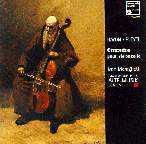 Critics have
hailed this as the best original instrument recording of Haydn's
cello concertos, and I would agree. Russian cellist Monighetti's
gritty, spirited playing won't please everyone. In the Allegro dance
movements he can sound more muscular and frenzied than one expects
in a baroque performance (and the strings rebel when he presses his
ancient cello: a Ruggeri, Cremona 1693), but in general his touch is
sure and tasteful, especially in the richly lyrical Adagios. The
East Berlin-based Akademie für Alte Kunst provides superbly crisp,
sonorous back-up. The "filler", Pleyel's rarely heard cello
concerto, is a wonderful discovery in itself. Monighetti plays his
own cadenzas: a wink at the Marseillaise in Haydn's D major and at
Mozart's aria "Se vuol balare" in the Pleyel. Good English, French,
German notes and a natural, balanced recorded sound complete this
fine offering.
Critics have
hailed this as the best original instrument recording of Haydn's
cello concertos, and I would agree. Russian cellist Monighetti's
gritty, spirited playing won't please everyone. In the Allegro dance
movements he can sound more muscular and frenzied than one expects
in a baroque performance (and the strings rebel when he presses his
ancient cello: a Ruggeri, Cremona 1693), but in general his touch is
sure and tasteful, especially in the richly lyrical Adagios. The
East Berlin-based Akademie für Alte Kunst provides superbly crisp,
sonorous back-up. The "filler", Pleyel's rarely heard cello
concerto, is a wonderful discovery in itself. Monighetti plays his
own cadenzas: a wink at the Marseillaise in Haydn's D major and at
Mozart's aria "Se vuol balare" in the Pleyel. Good English, French,
German notes and a natural, balanced recorded sound complete this
fine offering.
Haydn: Cello Concertos
Nos. 1 &. 2
Han-Na Chang, cello
Sinopoli /
Sächsische Staatskapelle Dresden
EMI 5565352
**
$$$
Korean-American cellist Han-Na Chang recorded
this album last September (1997) at the age of 14, two months before
she guested with the Montreal Symphony under Charles Dutoit. In
concert Chang seemed a bit overwhelmed by Tchaikovsky's virtuoso
Rococo Variations, but on this recording (abetted by
sympathetic miking and the grateful acoustic of Dresden's
Lukaskirche) she delivers a confident, nigh faultless performance of
Haydn's little gems. Just listen to the rich texture of the Adagio
of the Concerto in C, or
the remarkably precise rapid bowing in the Finale. The Dresden band
plays with grace and substance. The recorded sound is crystalline.
Chang's cello is not described. Cadenzas are by "another hand" in
the C major and by Rostropovich and Gendron in the D major. Though
this modern instrument recording breaks no new ground, it can be
warmly recommended.
Gershwin
Fantasy
Joshua Bell, violin
John Williams / London
Symphony Orchestra
Sony SK 60659
** $$$
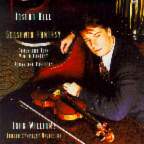 The Gershwin
Centennial Year is upon us with a disc of Gershwin favourites
arranged for violinist Joshua Bell by major Hollywood and Broadway
talents Tunick, Brohn, and Courage. Fantasy for Violin and
Orchestra is a 20 minute medley by Alexander Courage, composer
of the Star Trek theme. This splashy cinematic suite is the the kind
of formulaic commercial pastiche used on the Academy Awards show.
Three Preludes is Jascha Heifetz's delicate, tasteful little
transcriptions of Gershwin themes, lasting a mere 6 minutes, with
John Williams playing the simple piano part. Songs for Violin and
Orchestra are violin arrangements of hits like "I Got Rhythm"
and "Nice Work", including a sampling of Gershwin's 1926 historic
piano-roll recording of "Sweet and Low-down". Joshua Bell has got
rhythm and a sleekly responsive violin. John Williams and the LSO
play this familiar music with panache. Joshua Bell joins the
Toronto Symphony Orchestra at Roy Thompson Hall Sept. 23, 24, 26,
28. Info: 416-598-3375. The Gershwin
Centennial Year is upon us with a disc of Gershwin favourites
arranged for violinist Joshua Bell by major Hollywood and Broadway
talents Tunick, Brohn, and Courage. Fantasy for Violin and
Orchestra is a 20 minute medley by Alexander Courage, composer
of the Star Trek theme. This splashy cinematic suite is the the kind
of formulaic commercial pastiche used on the Academy Awards show.
Three Preludes is Jascha Heifetz's delicate, tasteful little
transcriptions of Gershwin themes, lasting a mere 6 minutes, with
John Williams playing the simple piano part. Songs for Violin and
Orchestra are violin arrangements of hits like "I Got Rhythm"
and "Nice Work", including a sampling of Gershwin's 1926 historic
piano-roll recording of "Sweet and Low-down". Joshua Bell has got
rhythm and a sleekly responsive violin. John Williams and the LSO
play this familiar music with panache. Joshua Bell joins the
Toronto Symphony Orchestra at Roy Thompson Hall Sept. 23, 24, 26,
28. Info: 416-598-3375.
Hans Krása : Verlobung in
Traum
Zagrosek / Deutsche Symphonie-Orchester Berlin
London 289-455-587-2
*** $$$
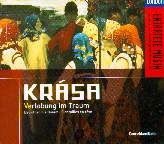 Here is another
interesting world premiere recording in London/Decca's Entartete
Musik series, a project which has unearthed many forgotten
masterpieces. Hans Krása was a Jewish Czech composer best known for
the children's opera Brundibar, written in the Terezin
concentration camp where he died. Verlobung in Traum
(1928-30) or, Betrothal in a Dream, originally called
Fedya, is Krasa's only other opera, a 2-act, 5-scene work
based on Dostoevsky's story Uncle's Dream. The plot tells of
Zina, a young woman in love with the absent, dying artist Fedya.
Zina's mother tries to marry her daughter to a rich but forgetful
old Prince. Jealous relatives convince the Prince that his betrothal
to the beautiful girl was a dream. The Prince departs, the Mother is
foiled, Zina is free, but Fedya dies before she can marry him. The
prologue and epilogue sung by the town registrar, framing the story
as a flashback, is the best part of this opera. Though the
tragicomic plot is lively and concise, with minimal verbiage, the
musical inspiration is patchy. Verlobung sounds like a
watered down mix of Janacek, Berg, and Shostakovich. There are too
many noisy vocal duets, trios, and quartet, without dramatic
purpose. The scoring is sophisticated, with flashes of genius,
including a brilliant send-up of Bellini's Norma, but lacks
sustained development or depth. You can skip every other track
without missing much. The orchestral playing, singing and recorded
sound is all top-notch. Krása's 15 minute Symphonie (1923) is also included with the opera. Libretto in French,
English, German.
Here is another
interesting world premiere recording in London/Decca's Entartete
Musik series, a project which has unearthed many forgotten
masterpieces. Hans Krása was a Jewish Czech composer best known for
the children's opera Brundibar, written in the Terezin
concentration camp where he died. Verlobung in Traum
(1928-30) or, Betrothal in a Dream, originally called
Fedya, is Krasa's only other opera, a 2-act, 5-scene work
based on Dostoevsky's story Uncle's Dream. The plot tells of
Zina, a young woman in love with the absent, dying artist Fedya.
Zina's mother tries to marry her daughter to a rich but forgetful
old Prince. Jealous relatives convince the Prince that his betrothal
to the beautiful girl was a dream. The Prince departs, the Mother is
foiled, Zina is free, but Fedya dies before she can marry him. The
prologue and epilogue sung by the town registrar, framing the story
as a flashback, is the best part of this opera. Though the
tragicomic plot is lively and concise, with minimal verbiage, the
musical inspiration is patchy. Verlobung sounds like a
watered down mix of Janacek, Berg, and Shostakovich. There are too
many noisy vocal duets, trios, and quartet, without dramatic
purpose. The scoring is sophisticated, with flashes of genius,
including a brilliant send-up of Bellini's Norma, but lacks
sustained development or depth. You can skip every other track
without missing much. The orchestral playing, singing and recorded
sound is all top-notch. Krása's 15 minute Symphonie (1923) is also included with the opera. Libretto in French,
English, German.
Mendelssohn : 17 Lieder
ohne Worte
Grieg : 31 Lyric Pieces
Walter Gieseking,
piano
EMI Références 7243 5 6677524
*** $$
Legendary German pianist (and Nazi) Walter
Gieseking is best known for his incomparable Debussy recordings but
his genius equally illuminates these mono recordings of romantic
parlour pieces. His mastery of delicate shading and supersubtle
rubato positively irradiates the fine selection of 17 Mendelssohn
Songs without Words. It is impossible to listen to one
without listening to them all. The selection of 31 of Grieg's
altogether more serious Lyric Pieces is equally impressive.
Disc Two includes 4 Lyric Pieces as one Scene from Country
Life, Op. 19, recorded in
1948. The rest of the Mendelssohn and Grieg was recorded in 1956,
just before Gieseking's death. Although not a serious flaw, the
piano's tone is slightly metallic in the treble and dull in the
bass. This may be normal for 1958 mono recording, or it may be due
to ART, the mysterious new Abbey Road Technology remastering that
irritates many audiophiles.
Jane Eaglen : Mozart
and Strauss Arias
Zubin Mehta / Israel Philharmonic (Sony
SK 60042)
** $$$
Frustrating is the only word to describe English
soprano Jane Eaglen's recording career to date. Though impressive
live, Eaglen's two recital discs for Sony have been sadly uneven,
her English Tosca (Chandos) is unlistenable, and her live Norma
(EMI) a let-down. Her first CD of arias (Sony SK 62032, reviewed in
La Scena Musicale Vol. 3 No. 4) had good Wagner and bad
Bellini. Her new Mozart/Strauss disc is again 50/50. First Strauss:
her Final Scene from Salome has a few nice colours, average
diction and weak low notes. Dramatically, you'd never guess she was
a nymphomaniac killer fondling a decapitated head. Ljuba Welitsch on
the recent Karajan Edition (EMI 724356639423) or her Complete
Columbia Recordings (Sony MH2K 62866) are miles better. "Es Gibt ein
Reich" has gorgeous high notes but no low notes, so her
"Totenreich!" is laughable. Arabella, Frehild (Guntram) and
Helena's "Zweite Brautnacht!" are incomplete sucesses, for the same
technical and interpretive reasons. Mozart finds Eaglen good in the
recitative of Lucio Silla, but breathy in the aria. Her
powerful "Or sai chi l'onore" hints at a great Donna Anna, but "Idol
mio" from Idomeneo is the only aria on
this disc that unites correct singing and suitable emotion. Give me
Deborah Voigt over Eaglen any day (don't miss Voigt's Quebec City
recital March 1, 1999). Opera
Gala
We live in the golden age of compilations,
but it pays to shop around. Here's a buyers' guide to London/Decca's
Opera Gala series:
-
*** Puccini: Suor Angelica. Bonynge/National
Philharmonic. 289-458-218-2. Sutherland's only recording of this
opera is worth having, though it could be more dramatically
convincing.
-
*** 20 Great Tenor Arias. 289-458-215-2. Six good early Pavarotti
arias, an excellent del Monaco and fine samples of Bjoerling, di
Stefano and Corelli make this a respectable beginner's tenor
album.
-
*** Marilyn Horne : Rossini Heroes and
Heroines. 289-458-219-2. An
excellent compilation of a unique singer doing what she does best
- *** Mozart: Die Zauberflöte
.
Solti/Wiener Philharmoniker. 289-458-213-2. This is such a great
Magic Flute you'll
want the whole recording. The entire cast is fabulous, especially
Hermann Prey's charming Papageno and Deutekom's laser-precise
Queen of the Night.
-
*** Splendours of Russian Opera.
289-458-216-2. Give the current shortage of Russian opera
compilations, this is worth having. The voices are good, and the
selection will whet your appetite for more.
-
** Wagner : Der Ring des Nibelung
(excerpts). Solti/Wiener Philharmoniker. 289-458-210-2. The
complete Solti Ring is a classic, but you can't boil 14 CDs
down into one. The basic bleeding chunks are here, but not Wotan's
Farewell. Buy the whole Ring
and enjoy it for the rest of your life.
-
** Favourite Wagner Overtures. Solti /
Chicago Symphony & Vienna Philharmonic. 289-458-214-2. Six
overtures, none from the Ring. A boring Ride of the
Valkyries, sloppy Tannhauser, and gritty strings in
Meistersinger disqualify this disc from
serious consideration.
-
** Verdi : La Traviata. Pritchard/Florence.
289-458-211-2. Sutherland is content to make pretty sounds.
Bergonzi is barely involved, Merrill is emotionless. Good voices,
no drama.
-
** Joan Sutherland : Greatest Hits. 289-458-209-2. The best of Dame
Joan's singing is already available in numerous economical
anthologies (Best Of, Diva, etc), making this random selection
pointless.
Vivaldi : L'estro
armonico, op. 3
Fabio Biondi / Europa Galante
Virgin
Veritas 7243 5 4531521
*** $$
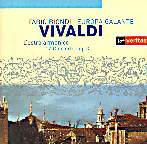 Biondi's first recording for Virgin/ EMI
after leaving Opus 111 is an unqualified success. The Italian
maestro breathes exciting new life into the 12 concerto masterpeices
of Vivaldi's youth. Biondi's enthusiasm leads him to take liberties
which might annoy traditionalists, but anyone who appreciates superb
sound and joyful interpretation will be pleased. The recorded sound
is clear, organic, balanced and detailed. Good notes in French,
English and German. A steal at mid-price.
Biondi's first recording for Virgin/ EMI
after leaving Opus 111 is an unqualified success. The Italian
maestro breathes exciting new life into the 12 concerto masterpeices
of Vivaldi's youth. Biondi's enthusiasm leads him to take liberties
which might annoy traditionalists, but anyone who appreciates superb
sound and joyful interpretation will be pleased. The recorded sound
is clear, organic, balanced and detailed. Good notes in French,
English and German. A steal at mid-price.
Beethoven
: Piano Concerto No. 5 & Violin Concerto
Jos van
Immerseel, fortepiano / Vera Beths, violin
Bruno Weil /
Tafelmusik (Sony SK 63365)
** $$$
This 1997 recording of Beethoven's Piano
Concerto No. 5 is a big improvement over Tafelmusik's dreary
1996 recording of the Beethoven Piano Concertos Nos. 3 &
4 (SK 62824) with the same conductor, pianist, fortepiano,
producer and engineers. It would seem the new recording benefits
from the acoustic of the Kursaal in Bad Tölz. The fortepiano sounds
clearer and less sticky, though Immerseel's fingering is still often
sluggish and leaden. As before the bassoons are feeble, but the band
sounds louder, richer, better balanced, almost modern. The Violin
Concerto is the reason to get this
disk. Vera Beth is an intelligent artist, getting the maximum out of
her Strad under difficult authentic conditions. The resulting
performance is spontaneously enjoyable, transcending the technical
limitations of a period instrument band.
|


